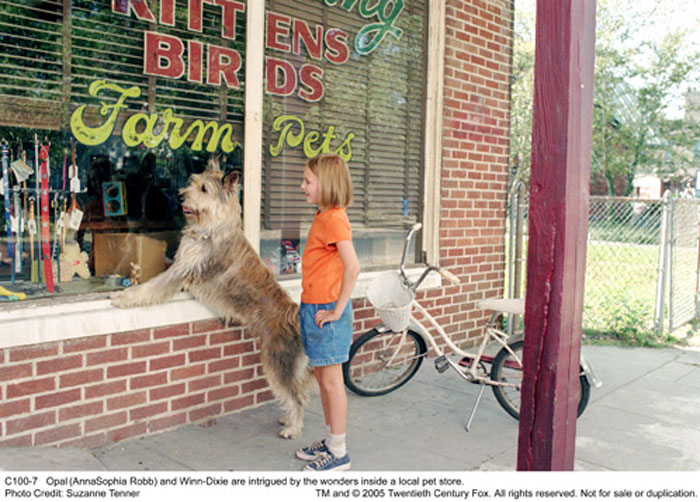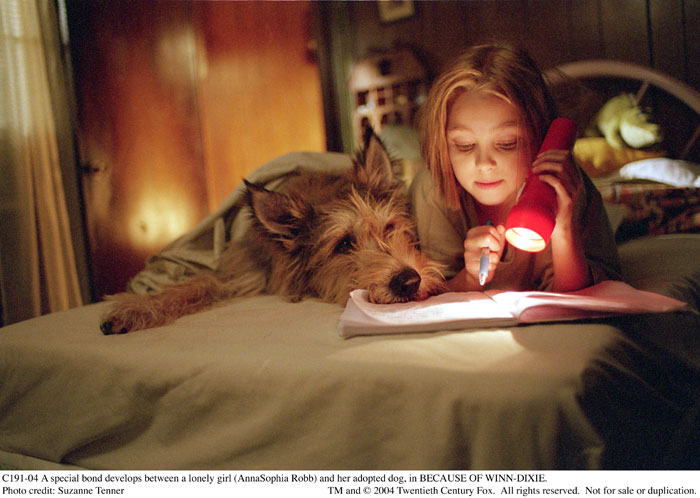From the Chicago Reader (February 18, 2005). — J.R.
Uncle Nino
** (Worth seeing)
Directed and written by Bob Shallcross
With Joe Mantegna, Pierrino Mascarino, Anne Archer, Trevor Morgan, and Gina Mantegna
Because of Winn-Dixie
** (Worth seeing)
Directed by Wayne Wang
Written by Joan Singleton
With AnnaSophia Robb, Jeff Daniels, Cicely Tyson, Dave Matthews, and Eva Marie Saint
An uninvited guest joins an already stressed household, causing pandemonium and upsetting the neighbors as well. The preoccupied, absentminded father assumes this obstreperous if good-natured invader is visiting only temporarily, but on and on he stays, irritating almost everyone apart from the young daughter. Eventually the interloper wins everyone over and brings them all together.
That’s the familiar plot of not one but two current commercial releases, both wholesome family pictures. The visitor in Uncle Nino, which opened last week, is the title hero (Pierrino Mascarino), an elderly Italian peasant with a minimal knowledge of English who flies to the U.S. to visit the family of his nephew Robert (Joe Mantegna) after his brother, Robert’s father, dies. The visitor in Because of Winn-Dixie, which opens this week, is also the title hero, a stray dog in a small town in southern bayou country that’s taken in by the ten-year-old heroine, Opal (AnnaSophia Robb), the daughter of a Baptist preacher (Jeff Daniels).
Nino causes a commotion when he squeezes and bites into pieces of fruit in the supermarket, then refuses to pay for the ones he doesn’t like; Winn-Dixie is found by Opal when he’s racing down the aisles of the local supermarket (she claims he’s her pet, and when asked his name, she blurts out the store’s name). Nino interrupts one of Robert’s board meetings to pass out food; Winn-Dixie disrupts the church service in a convenience store by chasing after a mouse and howling along with the congregation’s rendition of “Amazing Grace.”
Both movies have familiar and even hokey aspects, but they’re also sincere rather than cynical, and there’s something affecting about the very similar messages they’re peddling. Both interlopers bring a good-natured spontaneity to a relatively closed community, which counts for more than all the substantial differences. In Uncle Nino, for instance, the family of four occupies a middle-class suburban home; in Because of Winn-Dixie Opal and her father live in a small trailer park.
In both movies the outsider cuts across the usual age and cultural divisions and persuades others to do the same: Nino winds up playing his violin in the garage band of Robert’s 14-year-old son Bobby (Trevor Morgan), and Winn-Dixie is the reason Opal befriends a former convict (Dave Matthews) who runs a pet store, an eccentric librarian (Eva Marie Saint), and a reclusive alcoholic (Cicely Tyson). Both interlopers seem to partially fill the gap left by the loss or disappearance of a family member whose absence is discussed only belatedly: Robert’s uncle in Uncle Nino and Opal’s mother in Because of Winn-Dixie.
No doubt the makers of these two films were unaware of each other’s projects, yet the similarity of the plots and outcomes suggests that both filmmakers are addressing the same feelings of isolation that so many Americans seem to feel. Anything arising from a natural and spontaneous impulse that breaks through this isolation is likely to have a rejuvenating effect, even if it’s initially seen as annoying.
Both Uncle Nino and Winn-Dixie are a breath of fresh air in staid and stale communities, upsetting the usual routines with an enthusiasm that can’t help but change things for the better. If capitalism is lightly tweaked in Uncle Nino and small-town Christianity in Because of Winn-Dixie, it’s only because they’ve been applied too rigidly and mechanically, not because the filmmakers want to dismantle either ideology.
What the filmmakers seem to want to critique most is intolerance. They point out contradictions in how these communities practice their beliefs in everyday life — contradictions the interlopers expose. It’s not a huge leap to the contradictions in some of this country’s current ideological projects, particularly the fear of outsiders so many Americans have shown since 9/11 even as they claim to go to war to secure the freedom of some of those outsiders. Nino and Winn-Dixie are familiar, earthy, humorous characters, and therefore unthreatening. The liberal message is that they may be “other” but they’re also a fresher and less- encumbered version of ourselves. It’s a simplification, but it’s a start.




